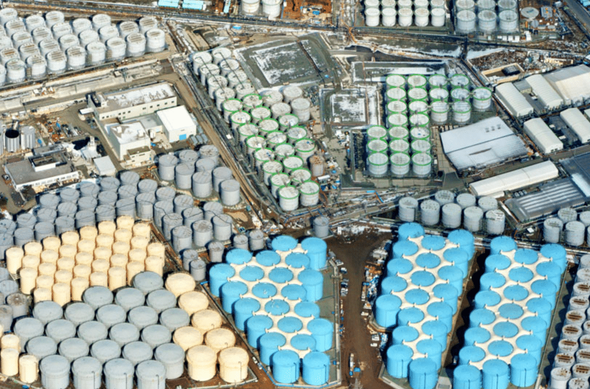hankyoreh
Links to other country sites 다른 나라 사이트 링크
Japan says it has no other option but to dump contaminated Fukushima water into ocean

The Japanese Ministry of the Environment has stirred up controversy with remarks suggesting it has no other option but to dump contaminated water from the Fukushima Nuclear Power Plant but into the ocean.
Addressing the matter of disposal of contaminated water from the Fukushima Daiichi Power Plant during a press conference on Sept. 10, Environment Minister Yoshiaki Harada said, “We [need to] discharge it [into the sea] to dilute it. We’ve considered several options, but I don’t think we really have a choice.”
When asked if he was proposing releasing contaminated water into the sea to dilute it, he replied, “The impression I have is that there is no other way.”
At the same time, Harada stressed, “This is an extremely important matter, and I can’t speak lightly about ‘what we need to be doing.’ I think the entire government should start having a prudent discussion.”
While Harada trailed off with his remarks, they signal that the Japanese government hopes to ultimately discharge contaminated water from Fukushima Daiichi into the ocean as a way of processing it. Conscious of the Seoul’s concerns about the possibility of contaminated water being released from the nuclear power plant, the Japanese government invited Tokyo-based diplomatic officials from 22 countries, including South Korea, to its Foreign Ministry complex on Sept. 4 for a briefing, where it stressed that no decision had yet been made on how to dispose of the contaminated water.
Contaminated water at Fukushima Daiichi remains an ongoing issue as underground water has continued to seep into the power plant site following a leak of radioactive material there in 2011. The Tokyo Electric Power Company (TEPCO), which operates Fukushima Daiichi, has used a radioactive material removal system known as ALPS (Multi-nuclide Removal Facility) to process the contaminated water. Once processed with ALPS, water is stored in talks on the Fukushima Daiichi site.
The problem is that the amount of contaminated water being stored reached 1.12 million tons early this year, while site issues mean that the limits of tank storage could be reached within just a few years. Also, based on an investigation of 890,000 tons of Fukushima Daiichi water that had undergone ALPS purification (950,000 tons total), it was announced in September 2018 that 750,000 tons – more than 80% – still included radioactive material above emission standards. Fukushima residents continue to oppose the release of Fukushima Daiichi water in the ocean on that basis, and the Japanese government has yet to proceed with the discharge.
Addressing Harada’s remarks in a regular press conference the same day, Chief Cabinet Secretary Yoshihide Suga said, “My understanding is that he was expressing his personal opinion based on the situation with the government’s examination.”
By Cho Ki-weon, Tokyo correspondent
Please direct comments or questions to [english@hani.co.kr]

Editorial・opinion
![[Editorial] Korea must respond firmly to Japan’s attempt to usurp Line [Editorial] Korea must respond firmly to Japan’s attempt to usurp Line](https://flexible.img.hani.co.kr/flexible/normal/500/300/imgdb/original/2024/0514/2317156736305813.jpg) [Editorial] Korea must respond firmly to Japan’s attempt to usurp Line
[Editorial] Korea must respond firmly to Japan’s attempt to usurp Line![[Editorial] Transfers of prosecutors investigating Korea’s first lady send chilling message [Editorial] Transfers of prosecutors investigating Korea’s first lady send chilling message](https://flexible.img.hani.co.kr/flexible/normal/500/300/imgdb/original/2024/0514/7917156741888668.jpg) [Editorial] Transfers of prosecutors investigating Korea’s first lady send chilling message
[Editorial] Transfers of prosecutors investigating Korea’s first lady send chilling message- [Column] Will Seoul’s ties with Moscow really recover on their own?
- [Column] Samsung’s ‘lost decade’ and Lee Jae-yong’s mismatched chopsticks
- [Correspondent’s column] The real reason the US is worried about Chinese ‘overcapacity’
- [Editorial] Yoon’s gesture at communication only highlights his reluctance to change
- [Editorial] Perilous stakes of Trump’s rhetoric around US troop pullout from Korea
- [Guest essay] Preventing Korean Peninsula from becoming front line of new cold war
- [Column] The state is back — but is it in business?
- [Column] Life on our Trisolaris
Most viewed articles
- 1[Editorial] Transfers of prosecutors investigating Korea’s first lady send chilling message
- 2Korea cedes No. 1 spot in overall shipbuilding competitiveness to China
- 3Major personnel shuffle reassigns prosecutors leading investigations into Korea’s first lady
- 4[Column] Samsung’s ‘lost decade’ and Lee Jae-yong’s mismatched chopsticks
- 5[Column] Will Seoul’s ties with Moscow really recover on their own?
- 6Second suspect nabbed for gruesome murder of Korean in Thailand, 1 remains at large
- 7[Editorial] Korea must respond firmly to Japan’s attempt to usurp Line
- 8[Correspondent’s column] The real reason the US is worried about Chinese ‘overcapacity’
- 9US has always pulled troops from Korea unilaterally — is Yoon prepared for it to happen again?
- 10Naver’s union calls for action from government over possible Japanese buyout of Line